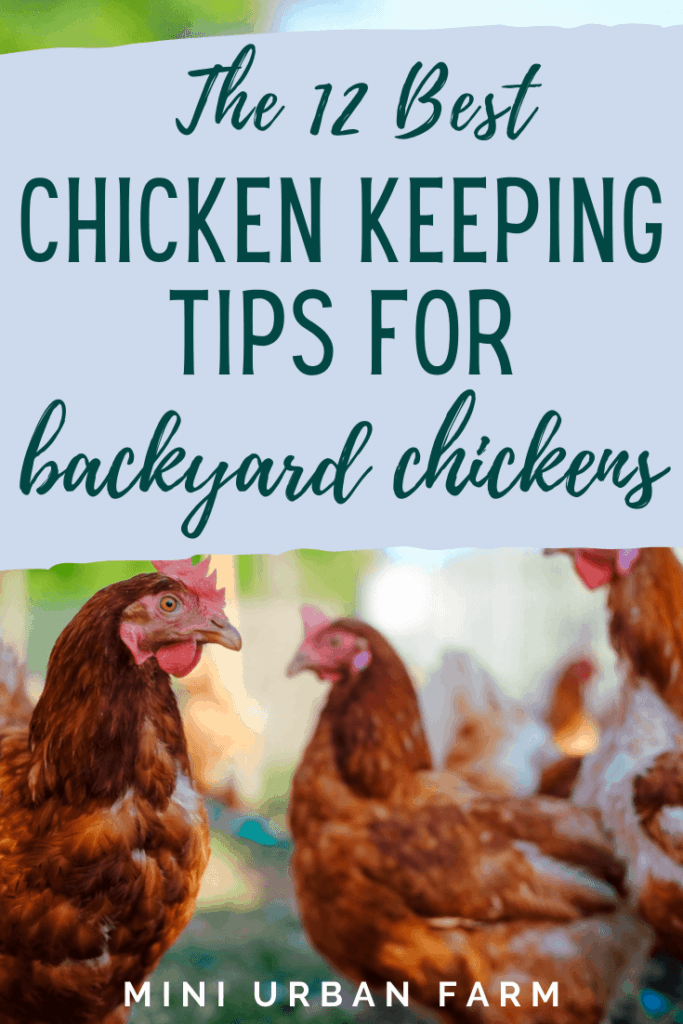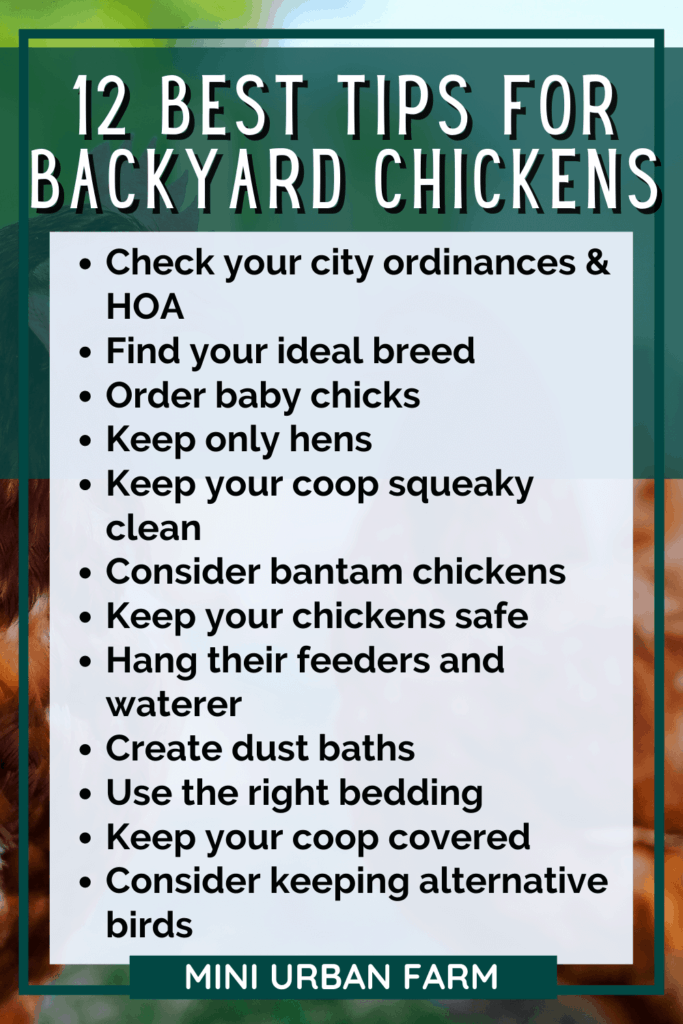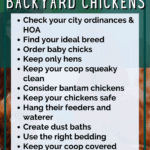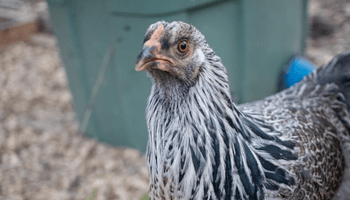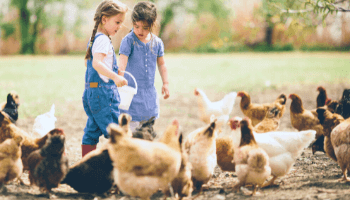As an urban chicken keeper, I have had to learn my fair share of chicken info in order to be successful with chickens! But a lot of the information out there talks about raising chickens in the country – with tons of space and no city ordinances! So I’ve compiled my best urban chicken keeping tips to help you raise your backyard flock in the suburbs!
Urban Chicken Keeping Tips:
- Check your city ordinances & HOA
- Find your ideal breed
- Order baby chicks
- Keep only hens
- Keep your coop squeaky clean
- Consider bantam chickens
- Keep your chickens safe
- Hang their feeders and waterer
- Create dust baths
- Use the right bedding
- Keep your coop covered
- Consider keeping alternative birds
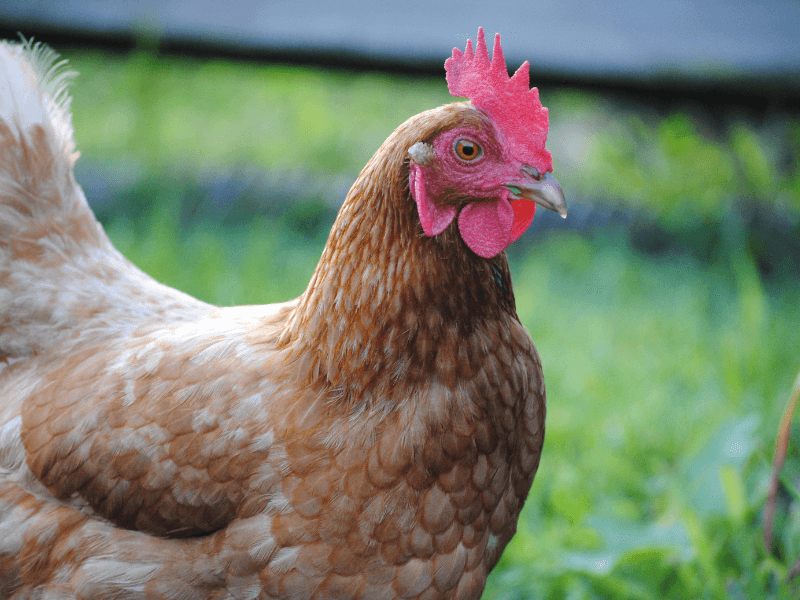
Disclosure: This post may contain affiliate links. If you purchase a product through one of our affiliate links we make a small commission from the sale at no extra cost to our readers.
URBAN CHICKEN KEEPING TIPS
Keeping chickens in your suburban backyard (or anywhere else in the city) is a delicate balance of nature and rules.
Not only do you have to follow your local regulations, but you have to think of your neighbors, your own space, and the birds as well.
These urban chicken keeping tips will help you navigate the chicken keeping world and have you collecting eggs in no time!
1) CHECK YOUR CITY ORDINANCES & HOA
You’ve decided on getting some chickens. You picked out your breeds. And you even have names picked out.
Then you find out your city doesn’t allow chickens.
That’s why the first step to raising backyard chickens is to check your city, county, and community rules and regulations.
Because there’s nothing worse than finding out you have to get rid of your flock once you have them!
Included in these regulations you’ll find:
- The number of animals you’re allowed to keep – if any
- Type of animals you can keep
- Rules you should follow such as keeping your animals tethered or leashed
- Animal abandonment, neglect, or cruelty, among others
Having this information beforehand helps you to know if you can keep your chickens in your backyard. And will help avoid paying hefty fines and having your animals taken away.
2) FIND YOUR IDEAL BREED
After you have complied with the city ordinances and home association restrictions, you can now start planning your flock.
But before going to a hatchery, you need to choose a chicken breed that fits your needs.
For example, if you’re looking to keep chickens for eggs, you will want to know the most productive egg laying chicken breeds.
The same case applies to keeping chickens for meat – or the best dual purpose chicken breeds. This helps you get an idea of the breed of chicks you will order from the hatchery or breeder.
When we first started out with chickens, we just went by cuteness. And in retrospect, that was probably a bad idea – but hindsight is always 20/20!
So 11 chickens later (and a lot of research) we ended up getting rid of almost our whole flock in exchange for a better dual purpose breed. Which was hard after naming them all!
3) ORDER BABY CHICKS
When you’re starting out, you should consider buying baby chicks instead of hatching your own eggs or getting fully grown birds.
First, if you’re buying fully grown birds there’s no guarantee on how old they are. They could be a year old (perfect egg laying age) or they could be 4 years old (and the egg laying will be much less.)
Plus, there’s no guarantee on how friendly they will be.
So getting baby chicks and raising them yourself will ensure that you’re birds are used to being handled and they’ll be friendlier overall!
4) KEEP ONLY HENS
Nobody likes being woken up by a crowing rooster at the crack of dawn.
Or listening to that same rooster at 1pm, 4pm, and just about every other time of day. Because if you didn’t already know, roosters crow at almost any hour!
So if you live in a community where your neighbors don’t keep chickens in the backyard, you’ll probably have some sort of noise ordinance to comply with.
Keeping just hens is a great option because not only do they give you tons of eggs, they are also docile and quiet – aka no crowing.
To ensure you’re buying only hens, don’t go for straight-run chicks. These are the chicks sold “as hatched” and you’ll be getting a mix of female and male.
Instead, opt for only “pullets” or female chicks.
Now, this might be a tad more expensive (by a few dollars), but you’ll have the peace of mind knowing you don’t have to get rid of any roosters later on. Making it one of the best urban chicken keeping tips I can give you!
5) KEEP YOUR COOP CLEAN
The easiest way to ensure a complaint from your neighbors is having a dirty chicken coop!
No one wants to smell a dirty coop, or deal with the creepy crawlies that come with it. Especially if it’s not their coop!
Which means that keeping your urban chicken coop clean is super important when it comes to backyard chickens.
Aim to clean it at least once per week, or implement a deep litter system to prevent it from smelling.
One of the best ways I’ve found to keep my coop smelling clean is by providing ample ventilation and using extra large wood chip mulch in the chicken run.
Less smell and less cleaning overall!
6) CONSIDER BANTAM CHICKENS
If you’ve never heard of Bantam chickens, they are basically the tiny versions of different chicken breeds.
And you can have bantams in lots of different breeds – Rhode Island Reds, Cochins, Orphingtons, etc.
Some of the advantages of keeping bantam chickens include:
- Size – Bantams are smaller than the average chicken, therefore, don’t require as much space. They are around half the size of regular chickens!
- They eat smaller quantities. Because of their size, they tend to eat less than their larger counterparts.
- They are quieter – smaller lungs = less noise!
- Easier to handle
Bantams are also great for kids since they are much smaller – making it easier for kids to handle.
Just keep in mind that bantams will lay smaller eggs than regular chickens. So if your goal is to have tons of large eggs check out these chicken breeds instead.
7) KEEP YOUR CHICKENS SAFE
Here in the suburbs it’s not likely you’ll lose chickens to large predators like bobcats and coyotes.
But it is possible to lose them to other predators such as snakes, foxes, raccoons, wild and domestic cats, and hawks.
That’s why keeping your flock safe is an important part of raising backyard chickens!
To keep your flock safe, you can put in safety measures such as:
- Covering their coop
- Bury hardware cloth and chicken wire at least a foot away from the coop to deter digging predators from getting to your chickens
- Be aware of the predators that are likely to attack poultry in your area such as hawks, snakes, possums, etc
- Check your coop for any access holes that predators such as snakes can slither through to eat eggs and attack your chickens
- Make sure all your birds are in their coop at night of you let them free range
- Don’t leave eggs and chicken feed laying around
While some things are unavoidable, making sure that you have put enough safety measures in place helps keep your flock safe and alive for longer.
8) HANG THEIR FEEDERS AND WATERERS
Chickens have horrible table manners.
They love to toss feed from side to side, topple it over by walking all over it, scatter it, and scratch it up.
Which creates a huge mess in the coop and wastes feed.
If you live in the country, this isn’t as much of a problem since they can free range and get their food while they run around.
But in the suburbs (where they might not be free-ranging) all of that feed on the outside of the coop will just go to waste!
Hanging your chicken’s feeders and waterers (like these ones) prevents spillage and deters chickens from pooping in them since they swing from the hanger.
And besides hanging their feeders and waterers, you can also use non-spill options such as nipple waterers to prevent them from drinking dirty water!
This also helps keep predators away since there will be less mess to attract other animals.
9) CREATE DUST BATHS
When country chickens roam around, they find dirt piles, scratch up the earth, and roll around for hours on the ground.
This helps them clean themselves and keeps their feathers free of parasites such as lice, mites, and fleas.
But in your backyard you’re less likely to have bare dirt and other spaces for them to dig up. And you probably don’t want that kind of mess anyhow!
That’s why giving your birds a dust bath to roll around in is essential!
Not only is it good for them, but it will keep your backyard cleaner too.
10) USE THE RIGHT BEDDING
There are tons of options for the bedding of your chicken coop. You can use wood shavings, sawdust, straw, dry leaves, sand, or even just dirt.
But whatever material you choose will definitely determine how icky your coop gets – and how much you need to clean it!
We used to use pine shavings, but they got smelly fast and we were constantly buying more shavings to add to the run.
Then we started talking to a neighbor who I’d never seen clean out his coop.
Turns out he uses extra-large hardwood chips on the floor of the chicken run. And only uses pine shavings in the nesting boxes.
This helps prevent the coop from smelling and since we switched over to this method, we almost never have to clean it out!
Since hardwood chips are absorbent and take much longer to break down, it prevents the need to replace them all the time.
Plus, the chickens scratch them around and mix in their droppings – so it never gets too messy!
11) KEEP YOUR COOP COVERED
A covered coop is essential to keep your chickens safe from predators, prevent nosy neighbors, and give your chicks some shade.
Plus, you can extend the roof onto the run as well to give your birds even more space to roam freely.
This is especially true if you don’t have a backyard that they can forage in or are not there during the day to keep an eye on them.
Covering your coop and run is also important to keep your flock safe from predators and to keep your flock from strolling into the neighbor’s backyard. Chickens can’t really “fly,” but they can use their wings to propel them over a gate or help them jump a fence!
12) CONSIDER KEEPING ALTERNATIVE BIRDS
Sometimes, even with permission from city ordinances to raise backyard chickens, you may not be allowed by your homeowners association to keep them.
In this case there are still options!
Most HOAs often focus their rules on chicken and turkey, overlooking other types of birds such as quail, doves, or pheasant. These are great options since you technically can’t get in trouble for something that’s not in the rules, and they don’t take up as much space as chickens!
I know plenty of urban homesteaders who keep quail instead of chicken – and still raise enough meat and eggs to provide for their families!
We recently added quail to our flock and so far they have been much quieter and less smelly!
HOW MUCH SPACE DO CHICKENS NEED?
Chickens need about 4 square feet of coop space each. And at least 10 square feet or “run” space.
Which means that even in a normal suburban backyard, it’s possible to keep a small flock of chickens!
Plus, we let our chickens free-range whenever we’re home so they have even more space to run around and eat bugs.
And the best part is that you really don’t need that many chickens if you’re just looking for some fresh eggs!
We have a large flock since we keep birds for meat and eggs. But if you’re wondering how many chickens you need per dozen eggs, you can check out this post to calculate the size flock you need!
PIN URBAN CHICKEN KEEPING TIPS!
